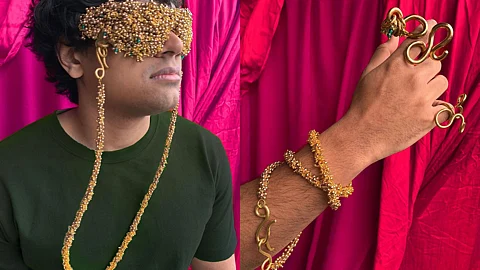
- HOMEGROWN WORLD
- #HGCREATORS
- #HGEXPLORE
- #HGVOICES
- #HGSHOP
- CAREERS
- ABOUT US
- CONTACT US

The idea of what jewellery ‘ought to be’ has truly crossed boundaries in recent times, far beyond necklaces, earrings and nose studs. We’re in the era of celebrating ostentatious designs and finding new ways of adornment through nail clips, hair accessories, and even functional jewellery like beaded bra straps, or a return to the old world of ornate spectacles, that make quite the ‘spectacle’. We're finding jewellery that morph into different things, based on how we want to present ourselves today, in this very moment.
A new diasporic South Asian voice that is now joining this growing world of transformative South Asian jewellery brands, is London-based Mrinmai Arun. A South Indian designer-maker now based in the UK, Mrinmai's work blends traditional influences with a fresh, experimental approach. Her journey, shaped by a deep connection to both her heritage and her learnings from the London College of Fashion (UAL), is already attracting attention with the launch of her debut collection, Saṃsāra.
The founder/designer of her eponymous brand, Mrinmai Arun’s path to jewellery design was anything but conventional. According to her portfolio, growing up in a diasporic community, she found herself constantly negotiating between two worlds: the rich traditions of her South Indian culture and heritage and the fast-paced, eclectic spirit of the Western world she was at home in. This duality is evident in her design philosophy, which balances intricate craftsmanship with a sense of playfulness and modularity.
After completing her BA in Fashion Jewellery from the London College of Fashion, Mrinmai honed her skills through a series of pivotal internships and contracts at well-known London brands. Her time at Completedworks, a fine and fashion jewellery label known for its sculptural designs, gave her hands-on experience in working with high-quality materials and ceramics. Meanwhile, her role as a stylist at Swarovski and Astrid & Miyu allowed her to understand the retail and commercial side of the jewellery industry, from visual merchandising to customer styling for events.
Her varied experiences, all in the realm of jewellery design and product have made Mrinmai a well-rounded creative with a deep understanding of various aspects of creating a jewellery brand. She’s worked in fast-paced environments, and developed skills in crafting jewellery, but also knows the importance of storytelling through design - all while maintaining a commitment to experimentation.
Mrinmai’s debut collection Saṃsāra, according to her social media, is more than just a line of jewellery: it's a conceptual exploration of reincarnation and transformation. The collection’s name is drawn from the Sanskrit term for the cycle of life, death, and rebirth, a theme that resonates deeply with Mrinmai’s diasporic identity.
In Saṃsāra, Mrinmai seeks to challenge the notion of what a "finished" product is when it comes to jewellery. As she puts it, "Finished is a trap." Her modular pieces are designed to evolve; never remaining in one fixed form but rather can be retrofitted to suit the wearer. This design philosophy also mirrors the deeper concept of reincarnation, where an individual’s soul continues to exist across multiple lifetimes, transforming but never losing its essence.
The pieces in the collection—including the dṛṣṭi eyewear, nāga chain, and Vikāra ear cuff - all of which can be worn in multiple ways. They are not limited to one typology; for example, an ear cuff might also function as a pendant or a bracelet could transform into a statement chain. This versatility allows the wearer to engage with the jewellery on a deeper level, creating a personal connection to the piece that evolves.
Mrinmai’s designs are rooted in natural and spiritual motifs, drawing inspiration from organic forms and ancient symbols. Her Naga ring, for example, takes its serpentine shape from the Nāga, the mythical snake deity in South Indian and Hindu mythology, symbolising both danger and protection. The ring’s fluid, sinuous form captures the idea of constant transformation and the ouroboro-esque spiritual concept of rebirth and renewal.
Her earlier design experiments, showcased on her Instagram, reveal a fascination with natural patterns—particularly coral formations, which recur in the Vikāra ear cuff in her debut collection. A popular design approach of current times, the organic, nature-inspired textures bring a tactile, almost primal quality to her pieces, reminding us of the natural world’s cyclical processes.
But what sets Mrinmai apart for me, is her commitment to modularity. There is always a question of the battle between aesthetics and functionality when it comes to fashion, especially with jewellery. But Mrinmai’s work is refreshingly interactive in how it goes beyond beauty and rather invites the wearer to participate in the evolution. Whether it's a necklace that becomes a bracelet or an ear cuff that morphs into a hair accessory, the aspects of adaptability to the wearer’s lifestyle and mood is an undeniably interesting factors that set the label apart.
Even beyond the battle of form vs. function in the world of fashion, the modularity of Mrinmai’s designs is befitting timely, when the industry is grappling with questions of sustainability and overconsumption. By creating pieces that can be worn in multiple ways, designers like her are subtly challenging the throwaway culture of fast fashion. The modularity of these designs encourages consumers to invest in jewellery that they can cherish and transform for years to come. With Saṃsāra as her debut, Mrinmai Arun is evidently just getting started. Her journey so far reflects the spirit of the modern diasporic designer—rooted in tradition yet unafraid to explore new ideas.
Follow Mrinmai Arun here.
If you enjoyed reading this, here's more from Homegrown:
Symbolism, Masculinity, & Identity: Tracing The Evolution Of Men's Jewellery In India
Garden Of Ether's Ethical Handcrafted Jewellery Channels The Fragile Transience Of Life
Tanzire's Demi-Fine Jewellery Sets A Progressive & Modern Standard Of Homegrown Adornment
